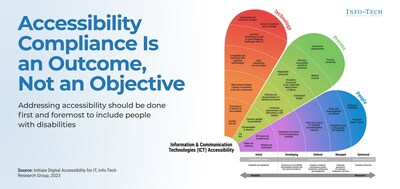Businesses require support and expertise to assist with their digital accessibility requirements. As new technologies continue to emerge, IT needs to be ready to act and respond, according to the global IT research and advisory firm’s new resource.
TORONTO, ON, July 26, 2023 /PRNewswire/ – With an estimated 15% of the world’s population having some form of disability, there is an increased focus on how digital accessibility at the organizational level can be implemented and maintained. Amid rapidly emerging technologies, IT support is critical to the successful implementation and longevity of digital accessibility initiatives. Organizations are regularly presented with an opportunity to approach accessibility as a practice, not a project. To assist organizational and IT leaders in preparing for accessibility and inclusion, Info-Tech Research Group has released a new research-backed industry blueprint, Initiate Digital Accessibility for IT.
The global IT research and advisory firm explains in the new resource that making accessibility an organizational imperative via people, culture, and behavior change matures accessibility from compliance-driven to experience-driven. By addressing the necessary cultural changes, organizations will ensure that accessibility is viewed as an ongoing organizational practice and year-round priority, rather than a temporary and performative one.
“Even if an organization hasn’t fully committed to an accessibility standard, its leaders can proactively get ready by planting the seeds to change the culture,” says Heather Leier-Murray, senior research analyst of People & Leadership at Info-Tech Research Group. “By building understanding and awareness of the significant impact technology has on accessibility, it is possible to start changing behaviors. However, for sustained program use, change management practices are needed to effectively alter behaviors and build inclusion for people with disabilities.”
When creating an accessibility plan, many organizations can find it challenging to determine where to start. Info-Tech’s research shows that there is often a tendency to begin with technology or compliance, but the firm advises that accessibility must be a people-first initiative that is bolstered and empowered by the IT function, which should examine further technological and operational considerations. The blueprint suggests using IT security concepts to build the program, including risk management, compliance, and response and recovery.
In addition to its tips on building an accessibility program, Info-Tech has also identified two multi-pronged phases and their respective outcomes in the blueprint, as outlined below for IT teams and leaders initiating digital accessibility:
1. Phase one – Technology: planning IT’s accessibility requirements
a) Determine accessibility requirements of IT
b) Build the IT accessibility plan
Phase one outcomes: List of business needs and priorities, IT accessibility requirements and remediation plan for conformance, assessment of current state of accessibility conformance, prioritization of accessibility initiatives for IT, and accessibility commitment statement.
2. Phase two – People: change enablement of accessibility
a) Build awareness
b) Support new behaviors
c) Continuous reinforcement
Phase two outcomes: Team understanding of the accessibility program’s what, why and how, as well as its sustainment plan.
“Implementing an accessibility program requires many considerations: legal requirements, international guidelines, training for staff, ongoing improvement, and collaborating with accessibility experts and people with disabilities,” adds Leier-Murray.
The firm also advises in the resource that many within the organization will be learning a new way to behave and think, which can be unsettling. Patience, education, communication, support, and time are keys for success of the implementation of accessibility. Effective planning and continuous reinforcement of the new way of doing things is necessary to enable accessibility as the new status quo.
To access the full blueprint, download Initiate Digital Accessibility for IT.
To connect with an Info-Tech Research Group analyst for expert insights into enabling digital accessibility and the intersection between technology and accessibility, contact [email protected].
Additional related research can be found here:
- The Accessibility Business Case for IT
- Lead Staff through Change
- IT Diversity & Inclusion Tactics
- Implement and Mature Your User Experience Design Practice
Info-Tech Research Group is one of the world’s leading information technology research and advisory firms, proudly serving over 30,000 professionals. The company produces unbiased and highly relevant research to help CIOs and IT leaders make strategic, timely, and well-informed decisions. For more than 25 years, Info-Tech has partnered closely with IT teams to provide them with everything they need, from actionable tools to analyst guidance, ensuring they deliver measurable results for their organizations.
Media professionals can register for unrestricted access to research across IT, HR, and software and over 200 IT and industry analysts through the firm’s Media Insiders program. To gain access, contact [email protected].
For more information about Info-Tech Research Group or to view the latest research, visit infotech.com and connect via LinkedIn and Twitter.
![]() View original content to download multimedia:https://www.prnewswire.com/news-releases/as-digital-accessibility-becomes-an-organizational-directive-it-teams-will-play-a-fundamental-role-in-changes-says-new-research-from-info-tech-research-group-301883990.html
View original content to download multimedia:https://www.prnewswire.com/news-releases/as-digital-accessibility-becomes-an-organizational-directive-it-teams-will-play-a-fundamental-role-in-changes-says-new-research-from-info-tech-research-group-301883990.html
SOURCE Info-Tech Research Group

Featured image: Megapixl © Alexandersikov
















